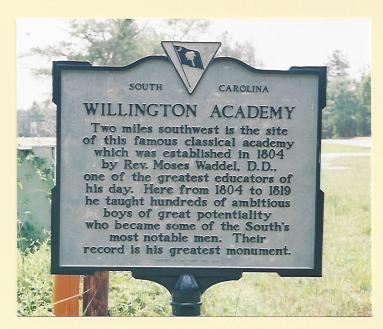
In 1819, Rev. Moses Waddel “was induced to give up his academy business” and take the reins of the University of Georgia. Born in North Carolina, educated in the ministry in Virginia and a preacher in Georgia, he had taught young John C. Calhoun and became the first native-born Southerner to fill the University presidency. It was not unusual then to hear open and reasoned discussion on ending the New England slave trade and returning Africans to their homeland.
Bernhard Thuersam, Chairman
North Carolina War Between the States Sesquicentennial Commission
"Unsurpassed Valor, Courage and Devotion to Liberty"
"The Official Website of the North Carolina WBTS Sesquicentennial"
Abolition Sentiment in Georgia
“Athens
[Georgia] and the Lower South at this time [1810] were in the midst of
laying the foundations of that social order and culture, beautiful and
polished yet seamy, captivating the elite Englishman and practical
Yankee who touched it, the admiration of some, the curse of some . . .
In
the excitement of the Federal Constitutional Convention, Georgia had
stood for the foreign slave trade, but she no sooner won it than she
freely flung it away. In 1819 at a banquet in Athens this toast was
drunk: “The [Foreign] Slave Trade – The scourge of Africa; the disgrace
of humanity. May it cease forever, and may the voice of peace, of
Christianity and of Civilization, be heard on the savage shores.”
At
this time the whole subject of slavery was discussed in the Georgia
papers with reason and dispassion, and in 1824 the president of the
University “heard the Senior Forensic Disputation all day on the policy
of Congress abolishing Slavery – much fatigued but amused.” Apparently
the students were doing some thinking also.
The
trustees, were, likewise not opposed to a possible disposition of
slavery, for [Rev. Robert] Finley, whom they had just elected president
of the University, had been one of the organizers of the American
Colonization Society. He was, indeed, present in Washington at its
birth and had been made one of its vice-presidents; and so vital did his
work appear to one friend that he later wrote,
“If
this colony [Liberia] should ever be formed in Africa, great injustice
will be done to Mr. Finley, if in the history of it, his name be not
mentioned as the first mover, and if some town or district in the colony
be not called Finley.” He, indeed, never lost interest in the project
to his dying day – and then it “gave consolation to his last moments.”
The
South was genuinely interested in ridding itself of this incubus,
realizing, with Henry Clay, that Negroes freed and not removed were a
greater menace than if they remained in slavery.”
(College Life in the Old South, E. Merton Coulter, UGA Press, 1983 (originally published in
1928), pp. 27-28)

http://www.pbs.org/wgbh/aia/part3/3p1521.html
ReplyDeleteInteresting - Finley was from NJ.
Question: I can understand wanting to set their slaves free but why send them to Liberia? How did the landowners expect to run their vast farms? The North had the larger population - did the South expect to get their labor force from there? I just don't understand the reasoning. Help(as usual)!
I can understand wanting to set their slaves free but why send them to Liberia?
DeleteThat country was even popular with Lincoln.
http://www.namsouth.com/viewtopic.php?t=4391&highlight=lincoln+liberia
What did Lincoln want done with blacks? He supported Colonization Society sending them to Liberia. War was all but over in March 1865, Congress was still debating funding to ship blacks to Africa (Congressional Record). This was during time US Congress was debating starving Confederates held in US prisons.
=======
How did the landowners expect to run their vast farms?
Damn if you do and damn if you don't. Probably like hooked on something, you want to quit, but it's difficult. Also, religion was so strong many people among them RE Lee stated that it was a curse, but believed that God had willed it to make them Christians which is made fun of now by the Marxists, but was in fact of prime importance back then.
Again, thank you for your help, Mr. Townsend. I've read some articles but it is getting late - will finish the cross referencing tomorrow. You always point me in the right direction! :0)
ReplyDeleteBetter watch out for the cliff ahead.:)
DeleteTeach the Glorious South, let the people know what they lost. Rebuild Brand Dixie!
ReplyDelete